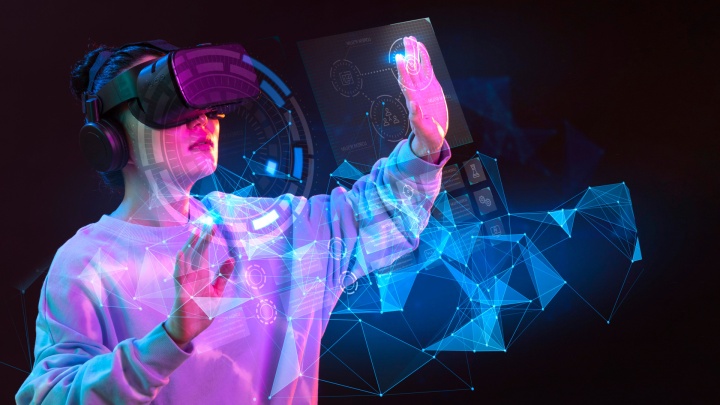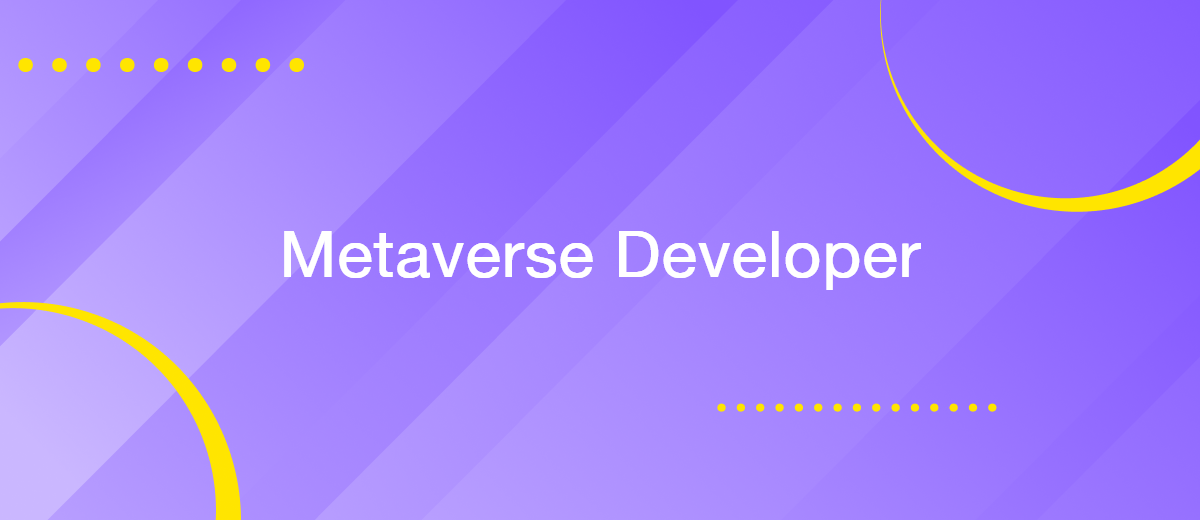Metaverse Developer: Building Digital Worlds at the Intersection of VR and Web 3.0
The metaverse is often called the next stage of the Internet and a key component of the Web 3.0 ecosystem. The innovation and prospects of this phenomenon stimulate active interest in it from large companies and the growing demand for qualified IT specialists. If you're curious about how to be a metaverse developer, this article covers the essential skills, tools, and career pathways you'll need to succeed. In addition, you will learn what awaits this profession in the future.
Who is a Metaverse Developer?
The metaverse is a virtual space where users can interact with each other and with digital objects in real time. It combines virtual (VR), augmented (AR), and mixed (MR) reality technologies, creating 3D worlds that complement our physical reality. Moreover, the metaverse includes Web 3.0 elements such as blockchain and NFT (non-fungible tokens), allowing the creation of decentralized platforms with unique capabilities.
A metaverse developer is an IT specialist who designs, creates, and maintains such virtual worlds. Their work is aimed at creating platforms that combine advanced technologies with the capability of large-scale user interaction.
The key tasks of developers depend on the specifics of the project. For example, they can develop virtual spaces with rich graphics, implement elements of the digital economy, such as NFTs and cryptocurrencies, or develop mechanics that facilitate user interaction. Metaverse development combines both technical and creative aspects, requiring specialists to have deep expertise and the ability to work with innovative tools.
To work effectively, a metaverse developer must have a wide range of skills, from programming and 3D modeling to using XR technologies and working with blockchain. These competencies allow them to create complex and functional digital ecosystems that determine the future of virtual worlds.
Technical Stack
Those wishing to learn metaverse development need to master a broad technical stack, including key tools and technologies that are necessary for creating and supporting virtual worlds. This knowledge helps developers solve complex problems and adapt projects to modern requirements.
The main components of the tech stack are:
- Programming languages. This is one of the basic skills that every metaverse developer must master. First of all, a beginner specialist needs to master the languages in demand in this industry: Python, Java, JavaScript, C++, C#, Swift, and Rust. Equally important is an understanding of programming concepts: cycles, control logic, encapsulation, and so on.
- Experience in software development. Particular attention should be paid to games, mobile, and web applications. The creation of metaverses is inextricably linked to cross-platform development, so the specialist must be able to adapt projects to several platforms. In addition, they must understand the API and other relevant technologies.
- XR technologies. The list of skills required for a metaverse developer necessarily includes experience with extended reality (XR) technologies, which include VR, AR, and MR. XR is one of the priority tools for metaverse developers. They need to know its terminology and concepts, as well as be able to develop VR/AR/MR content using existing resources.
- Blockchain. The active use of blockchain technologies in metaverses makes expertise in this area important for their developers. Decentralized databases are the foundation of the virtual economy. Thanks to them, users can store, buy, sell and exchange digital assets (NFTs) for cryptocurrencies and real money.
- 3D modeling and UI/UX. Any metaverse developer should be able to work with popular game engines (Unity, Unreal Engine, Godot) and other 3D modeling tools. These technologies allow you to create three-dimensional virtual worlds with bright graphics and realistic physics, making them interesting and exciting for the audience. The expertise of such specialists is complemented by knowledge of UI/UX design, which improves user experience and helps them understand application interfaces more easily.
Core Development Areas

Creation of Virtual Worlds
The foundation of any metaverse is represented by virtual worlds. They are created considering many factors: from visual aesthetics and gameplay to the economic model and social mechanics.
Virtual world developers design more than just graphics and gameplay. They are also responsible for integrating interactive elements: avatars, digital objects, interaction objects, and infrastructure for multi-user interaction. For example, these could be virtual spaces for work, learning, or entertainment that allow users to communicate in real time.
Key development aspects:
- 3D world design. Using tools like Unity or Unreal Engine to create realistic environments with thoughtful architecture and details.
- Game mechanics. Designing interaction systems that make the world both visually appealing and engaging for users, including quests, tasks, and competitive elements.
- Social functions. Implementing mechanisms that simplify interaction between users: voice and text chats, grouping systems, or virtual events.
- XR integration. Optimizing the world to work with VR headsets, AR devices, and other technologies that provide deep immersion.
- Dynamic content update. Maintaining the world by regularly adding new objects, locations, and interaction scenarios.
Creating virtual worlds is a complex and multifaceted process that requires a combination of technical expertise, creativity, and a deep understanding of user needs. Such worlds become a key component of metaverses, forming the basis for their further development.
Implementation of NFT
NFT is the main tool for creating and managing digital assets in the metaverse. Developers integrate NFTs to implement unique content such as avatars, virtual real estate, and in-game items. This contributes to the development of the digital economy.
The work of a metaverse developer in this area includes the creation of smart contracts, the integration of blockchain technologies, and the optimization of platforms for the safe and convenient use of tokens. All this requires a deep understanding of the principles of decentralized networks and the ways in which they interact with virtual worlds.
The introduction of NFTs allows developers to not only improve the user experience, but also to create innovative mechanics that make metaverses more interesting and economically sustainable. Thanks to these solutions, metaverses become attractive to both users and businesses, opening up new opportunities for monetization and interaction.
Monetization and Integration of Cryptocurrencies
Cryptocurrencies play an important role in the metaverse economy, providing users with virtual means of payment. Metaverse developers integrate cryptocurrencies into the infrastructure of virtual worlds. In doing so, they create an internal economy that becomes an integral part of the user experience.
Work with cryptocurrencies is carried out in several directions:
- Token creation. Developers design and implement virtual tokens that function as internal currency. They can be linked to real cryptocurrencies, such as Bitcoin or Ethereum.
- Payment system integration. Metaverse developers provide interaction between the metaverse and external blockchain networks, allowing users to securely store and transfer their assets.
- Content monetization. Experts create mechanisms that allow users to earn tokens, for example, for completing tasks, creating content, or participating in virtual events.
- Security. Developers implement protocols to secure transactions and prevent fraud so that users can trust the virtual economy.
Integration of cryptocurrencies and content monetization in metaverses requires developers to have not only technical expertise in blockchain but also an understanding of economics, user preferences, and gamification mechanics. Successful implementation of these processes contributes to the development of the metaverse as a sustainable platform for business and user interaction.
Social Mechanics
Social mechanics are one of the main components of the success of any metaverse. They determine how effectively users can interact with each other and form virtual communities. Metaverse developers play a central role in the design and implementation of these mechanisms, providing convenient and engaging formats of social interaction.
The tasks of developers in this area are:
- Creating communication tools. Developing chat, voice, and video communication systems that integrate into virtual worlds. Thanks to them, users are able to interact in real time.
- Designing events and activities. Organizing virtual meetings, conferences, concerts, and gaming events that stimulate the social activity of users.
- Support for group dynamics. Implementation of functionality for creating teams, guilds, clubs, and other communities so that users can unite according to interests and goals.
- Social metrics and rewards. Developing rank, achievement, and rating systems to encourage interaction between users.
- Personalization elements. Developing capabilities to create unique avatars, profiles, and virtual spaces that enhance the sense of belonging to the metaverse.
To successfully implement social mechanics, metaverse developers must combine technical skills with a deep understanding of user behavior and community-building principles. These mechanics not only increase engagement but also create an emotional connection between users and virtual worlds.
Adaptation and Optimization of XR Technologies
XR technologies are an integral part of metaverses. Metaverse developers play a key role in integrating and optimizing these technologies, providing users with deep immersion and comfortable interaction with virtual worlds.
The main tasks of specialists:
- XR hardware integration. Developing solutions compatible with VR headsets, AR devices, and MR interfaces so that users can access the metaverse from multiple platforms.
- Performance optimization. Adjusting graphics, reducing lag, and increasing frame rates to ensure smooth XR experiences even on resource-constrained devices.
- XR content development. Creation of interactive 3D objects, scenarios, and interfaces that make interaction with virtual worlds more realistic.
- Testing and adaptation. Conducting regular testing of XR solutions to identify errors, improve user experience, and adapt to new technologies.
- Multi-user integration. Enabling real-time interaction between users via XR, including voice chats, collaboration, and visual effects.
Metaverse developers' work with XR technologies requires not only technical expertise but also a creative approach to crafting immersive and intuitive solutions. Their efforts grant users access to virtual worlds that are both interactive and highly realistic.
Career Path

The desire to participate in the development of new technologies awakens a serious interest in the question of how to become a Metaverse developer. Like other modern IT professions, this specialty requires applicants not only to have formal education but to engage in continuous self-education and acquire new skills.
Those wishing to become professional metaverse developers should follow these guidelines:
- First, get a bachelor's or master's degree in computer science. You'll need to acquire basic skills in programming, design, engineering, and other areas that are important to this profession.
- Most metaverse developer jobs descriptions require a number of skills. You will need knowledge of programming languages, game and software development, 3D modeling, VR technologies, data analytics, blockchain and NFT, AI, and machine learning.
- To prove your expertise, you will need course certificates. If possible, take specialized Certified Metaverse Developer programs. They provide beginner developers with the skills needed for this profession.
- A successful career in this field largely depends on the volume and quality of your personal portfolio. To interest potential employers, demonstrate your capabilities in practice. Develop personal projects and participate in third-party ones, publish your work on GitHub, and communicate and interact with other specialists on LinkedIn, Discord, and thematic forums.
A budding metaverse developer can choose one or more of the specializations available in this area:
- 3D game designer (responsible for the game component);
- metaverse cybersecurity specialist (creates mechanisms to protect the digital environment and assets);
- NFT developer (implements digital items);
- blockchain engineer (integrates blockchain and cryptocurrency technologies).
Market Overview
The metaverse software development market is showing active growth, which makes it a very promising direction for businesses and IT specialists. According to analysts' forecasts, it will grow by 38% over the next few years, reaching a capitalization of $710 billion by 2027. At the same time, an increase in the capitalization of the extended reality technology market (VR, AR, and MR) is predicted, which may reach $250 billion by 2028.
The positive dynamics of the market are inextricably linked to the intensive influx of audiences into popular metaverse projects. The active audience of such projects was about 400 million users per month. For example, one of the most popular online gaming platforms, Roblox, is visited daily by about 60 million users.
The list of the most well-known and attractive employers for specialists in this industry is headed by:
- Decentraland. The blockchain-based gaming platform provides users with a decentralized virtual world with the ability to buy and sell land, real estate, and other digital objects.
- Roblox. An online platform with elements of augmented reality, users can create games and other entertainment content on the Roblox Studio engine and share it all with each other.
- Sandbox. This popular gaming platform allows users to create, distribute, and monetize virtual experiences and impressions through blockchain and NFTs.
The average metaverse developer salary in the US starts from $80,000 per year for entry-level specialists and reaches $135,000 per year for experienced professionals. The actual salary depends on the qualifications, role, and experience of the applicant, as well as the size and location of the employer company.
Professional Challenges
Developing metaverses offers exciting opportunities for engineers. However, it is not without its challenges. A metaverse engineer encounters challenges such as technical limitations, high user expectations, and the need to adapt to rapidly evolving technologies. Such challenges require developers to combine flexibility, innovation, and a willingness to continuously learn.
To work successfully in this area, developers have to solve the following problems:
- Technical challenges. Metaverse platforms are still in their infancy. This creates a number of technical challenges for those working in the field. For example, the ever-growing number of online users makes it difficult for systems to scale and worsens latency.
- Balance between creativity and technology. Designing user interfaces for platforms with interactive 3D space is significantly different from traditional software. It requires developers to constantly search for a balance between the creativity of virtual worlds and the technical capabilities for their implementation on a variety of user devices.
- Continuous learning. Like other IT professionals, metaverse developers face the need for continuous self-education. Rapidly evolving technologies require them to adapt their technical background accordingly, quickly mastering and applying innovative solutions in their work.
Final Thoughts
The profession of virtual world developer is a unique opportunity for IT specialists to work at the intersection of innovative technologies such as VR, AR, blockchain, and NFT. Metaverse developers design and support complex digital ecosystems, creating interactive virtual worlds that change the usual approach to work, education, and entertainment.
The demand for such specialists is growing rapidly due to the growing adoption of metaverses and their implementation in various industries – from gaming to virtual commerce. High pay and career prospects make this profession attractive to beginners and experienced IT enthusiasts.
With the rapid development of Web 3.0 technologies and ecosystems, the profession of a virtual world developer remains one of the most promising in the near future. It is an excellent choice for those who want to be at the forefront of the digital revolution and create innovations that change the world.
Routine tasks take a lot of time from employees? Do they burn out, do not have enough working day for the main duties and important things? Do you understand that the only way out of this situation in modern realities is automation? Try Apix-Drive for free and make sure that the online connector in 5 minutes of setting up integration will remove a significant part of the routine from your life and free up time for you and your employees.

